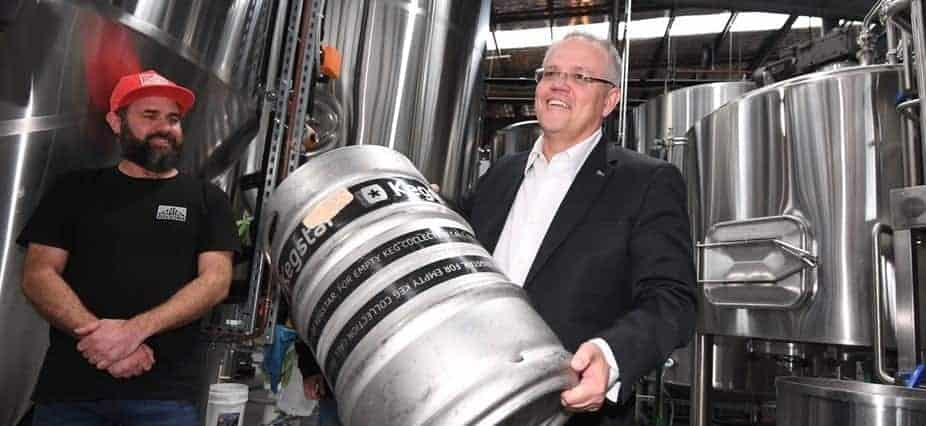When Scott Morrison did his pre-budget interview with the Nine Network – as treasurers have done for eons on the Sunday before the Tuesday – Chris Uhlmann asked: “Don’t you think one of the big problems this government has had from the outset is not a budget deficit, it’s a trust deficit?”
Morrison replied that since the 2016 election, every promise made had been kept.
When fighting the other side, governments invoke for weaponry things their opponents did in the past. When defending their own records, they ask people to forget the nasties they proposed or lines they ran at the time that have become inconvenient.
A public steeped in cynicism thinks about the present, but it has that past, even if it were under another prime minister and treasurer, still lurking in the back of its collective mind. It knows that, if the government is returned, a post-election budget can be very different from a pre-election one. So that’s where the vital element of trust comes in – will voters feel good about a benign budget, or just shrug it off with scepticism?
With the poll due in a year, people will view Tuesday’s budget as coming from a government desperate for approval, presenting a smiling face. Morrison is like the neighbour suddenly on your doorstep with a basket of home-grown vegetables, but you know it’s a preliminary to his asking for the use of your ride-on mower.
For now, everything is good. Fiscal circumstances and political needs have aligned for the Coalition. There is a bonanza of revenue, which will allow the government to provide tax cuts. There’ll be some spending initiatives, particularly in aged care.
As it targets specific sections of the community, Minister for Women Kelly O’Dwyer is flagging that later on she will deliver a women’s economic security statement, dealing with issues including female participation and retirement savings.
The income tax cuts are set to give priority to middle and lower income earners, at least in terms of timing, and will be spread out over a period, to make them more affordable. Morrison says they will be “real” but not “mammoth”, which could mean anything.
Important to how it is received will be the budget’s fiscal dimensions. There is speculation it may bring forward the return to surplus – set in last year’s budget for 2020-21 – which would be logical given the revenue improvement. Polling shows that many voters are anxious to see budget repair addressed, or say they are. More significantly, so are the ratings agencies – and they are fair dinkum.
Some critics argue that tax cuts should have been eschewed in favour of using the revenue surge, which can’t be guaranteed into the future, to fix the budget. Whatever the economic pros and cons, politically that was never an option.
Labor is singing the budget repair song. It too will have tax cuts for the election; as well, it will offer more spending in education and health than the government.
The ALP has available even more money over the longer term, because it says it would not go ahead with the tax cuts for bigger companies, or would repeal them if the government manages to legislate them (an increasingly difficult task after the revelations from the royal commission).
Labor is also getting funds from cracking down in various areas such as negative gearing, trusts and cash refunds from dividend imputation. It depicts these measures as promoting fairness, while the government calls them simply a tax grab.
In the budget’s lead up, we’ve seen the usual round of government “drops” and announcements (especially on infrastructure), the odd genuine leak, and plenty of picture opportunities. The most ludicrous moment surely came when Morrison and Finance Minister Mathias Cormann on Friday went to a small brewery to announce an excise change that helped craft brewers. One would think that days before the budget they’d be better served using the time to bone up on their numbers – but in this “image” age priorities are different. Anyway, being seen wrestling with a beer barrel is obviously preferable to being caught off guard smoking cigars, as Joe Hockey and Cormann were in what was for them a unfortunate snap before the 2014 budget.
If the budget bombed it would be disastrous for the Turnbull government. But it is hard to see that happening, given the revenue circumstances and the election-focused measures.
It is just possible, however, that it might be overshadowed. The High Court on Wednesday will bring down its decision on Katy Gallagher, the ACT Labor senator caught up in the citizenship crisis. If the finding on her were adverse, up to four byelections for House of Representatives members could follow, three in Labor seats and one in the seat of a crossbencher. That’s aside from the byelection that will be triggered by the planned resignation of Labor’s Tim Hammond, announced last week.
![]() The government is concerned that a decision against Gallagher could blow away the budget. It would largely blow away Bill Shorten’s Thursday night reply. But that would be only the start of the fallout such a decision would bring for both sides of politics.
The government is concerned that a decision against Gallagher could blow away the budget. It would largely blow away Bill Shorten’s Thursday night reply. But that would be only the start of the fallout such a decision would bring for both sides of politics.
________________________________________
By Michelle Grattan, Professorial Fellow, University of Canberra
This article was originally published on The Conversation. Read the original article.
TOP IMAGE: Scott Morrison being seen wrestling with a beer barrel is obviously preferable to being caught off guard smoking a cigar. (Lukas Coch/AAP/The Conversation)












